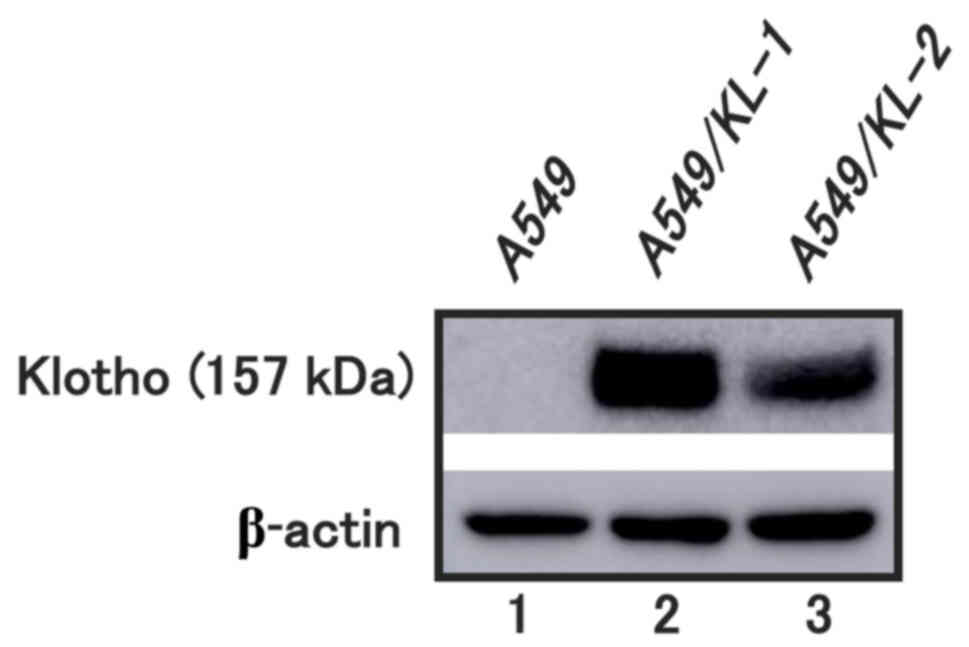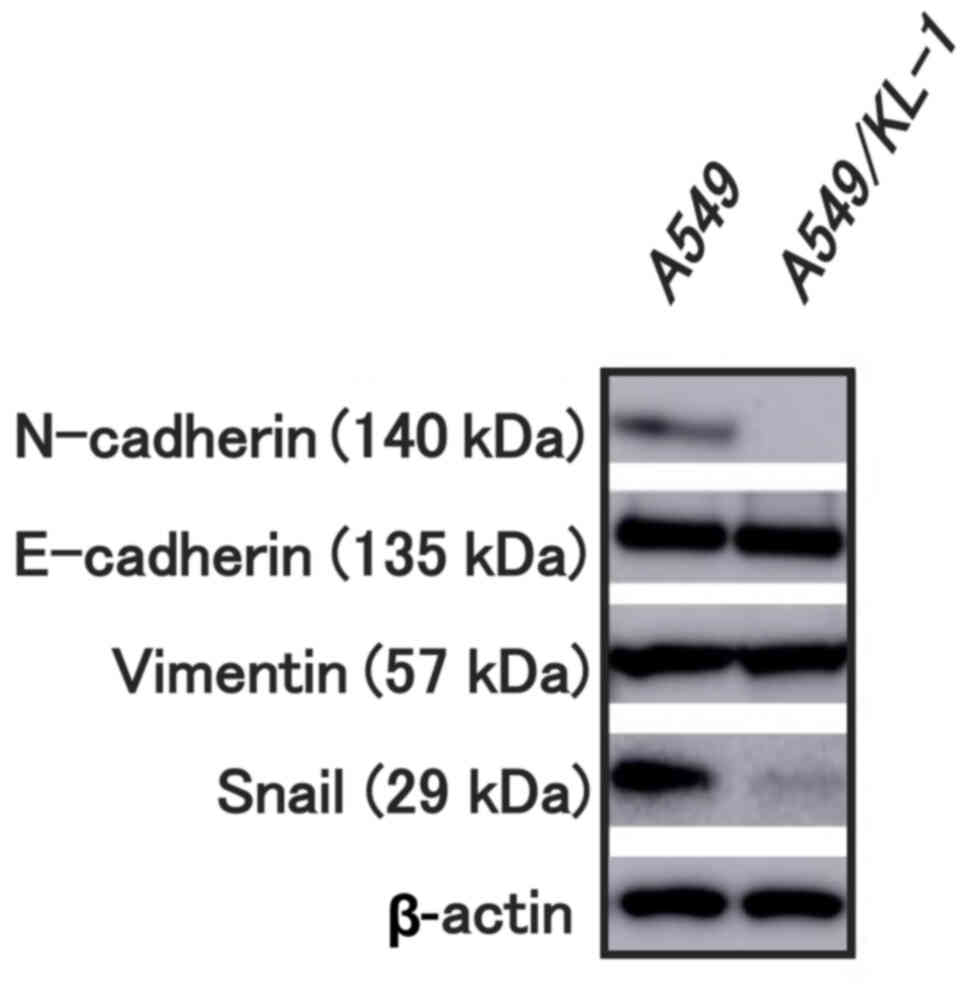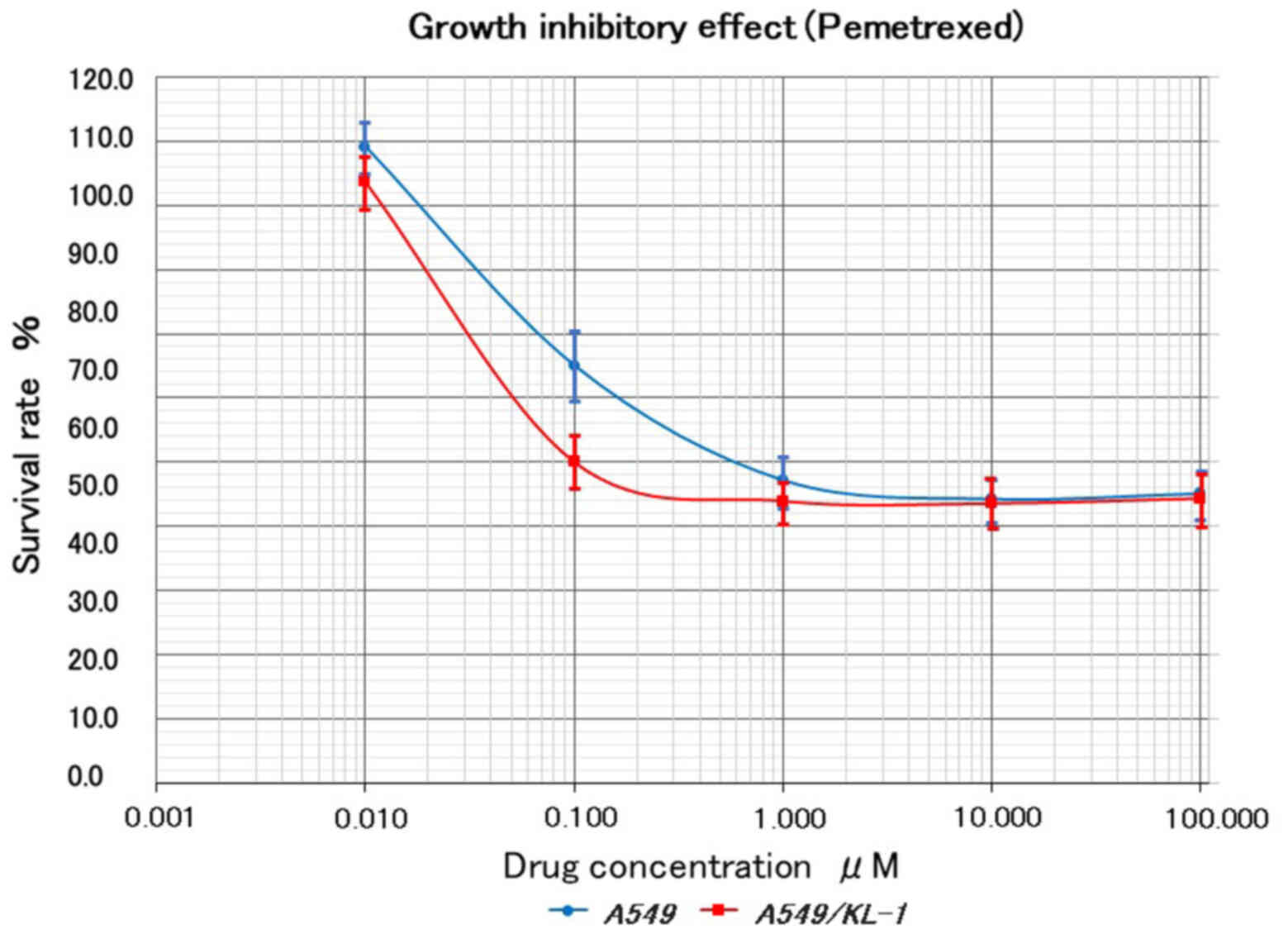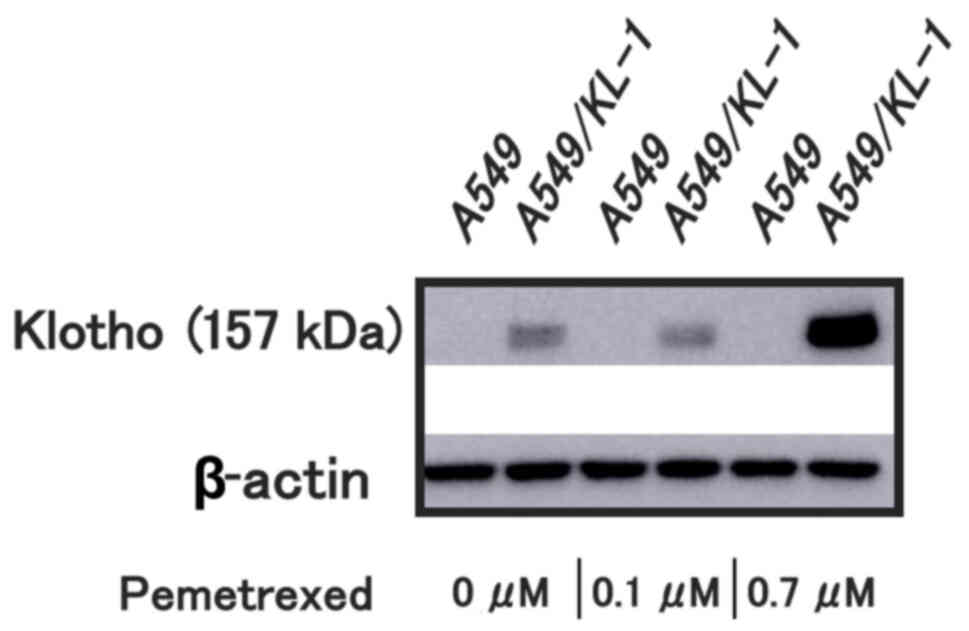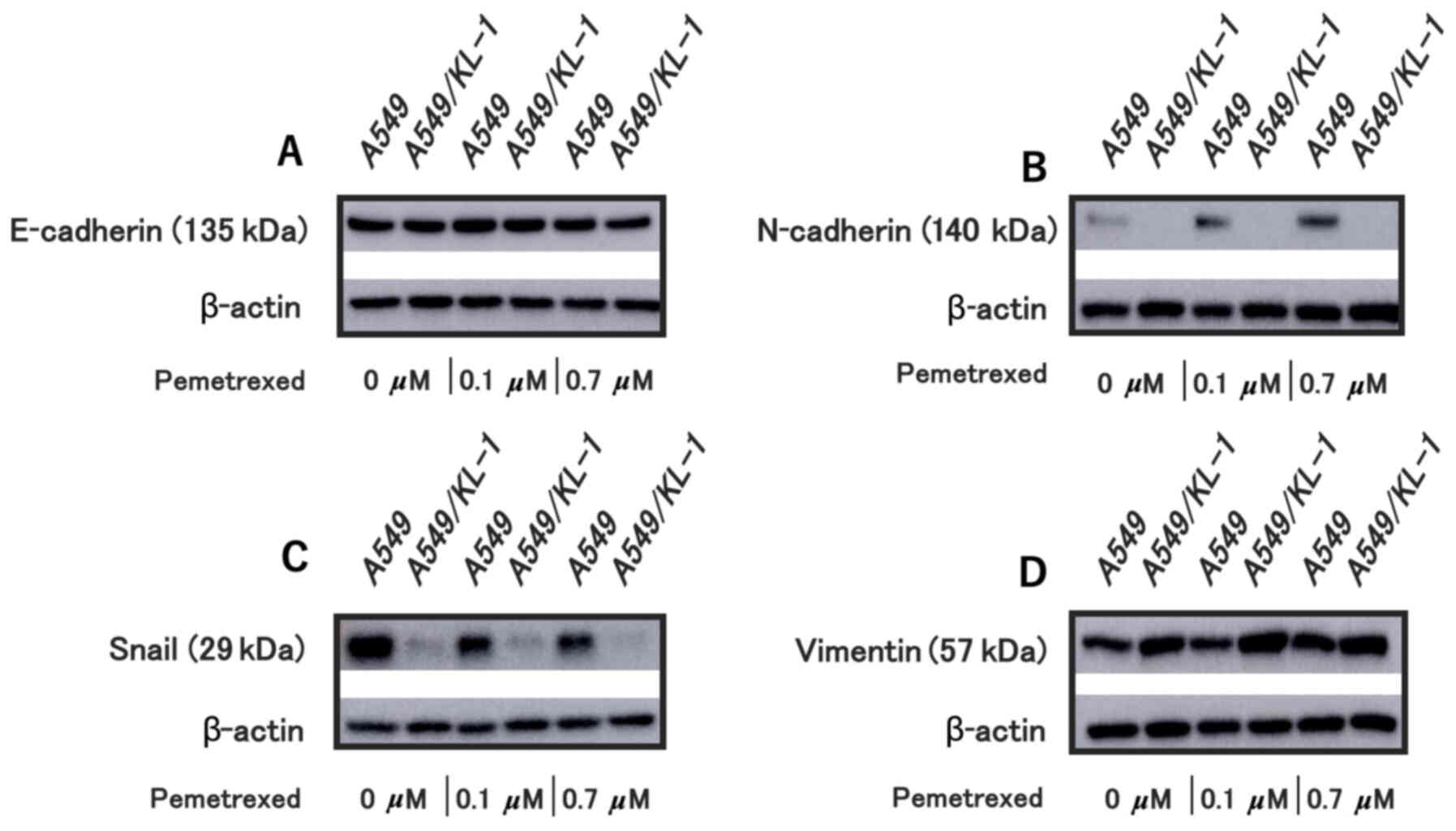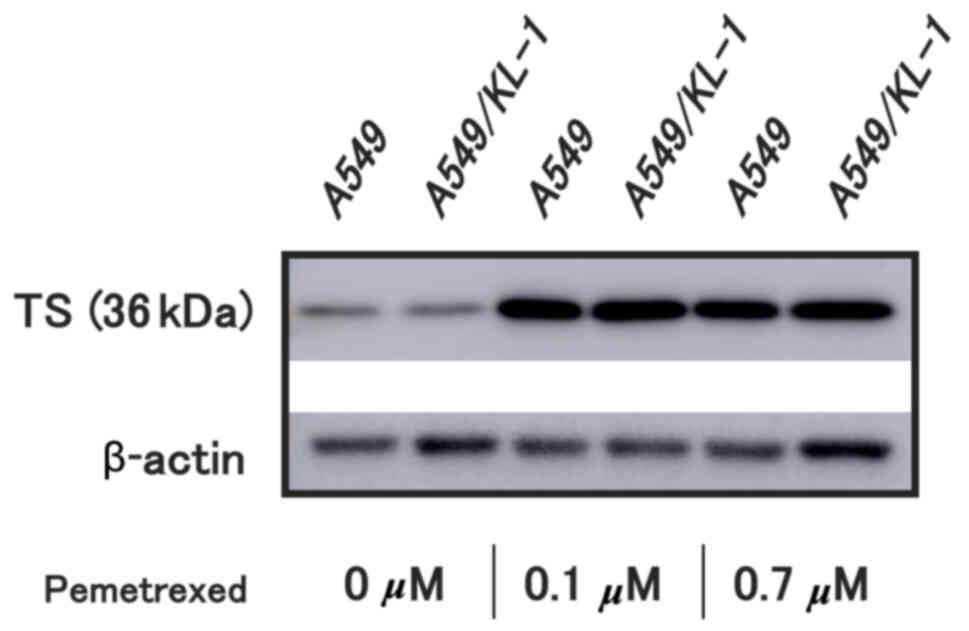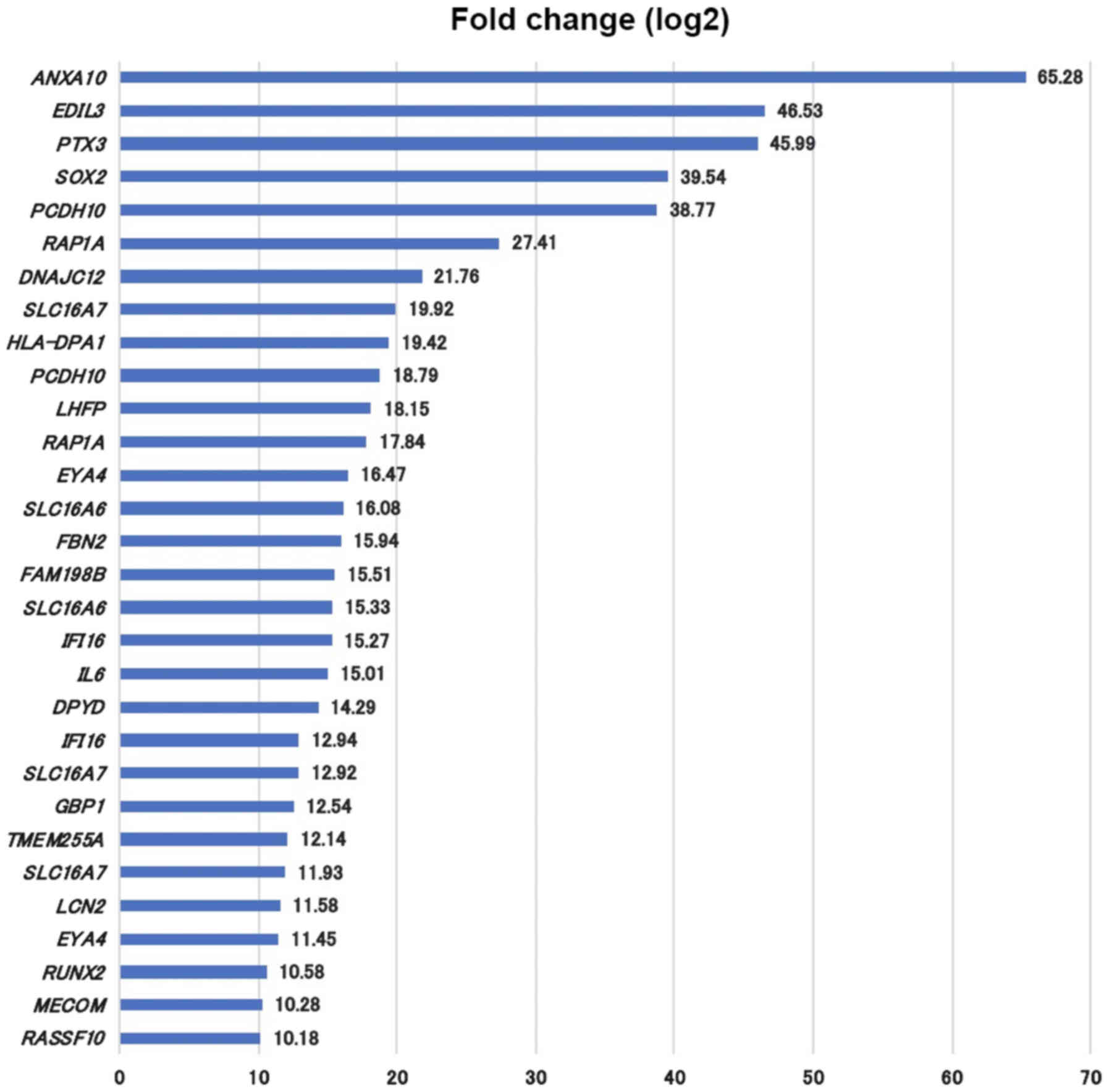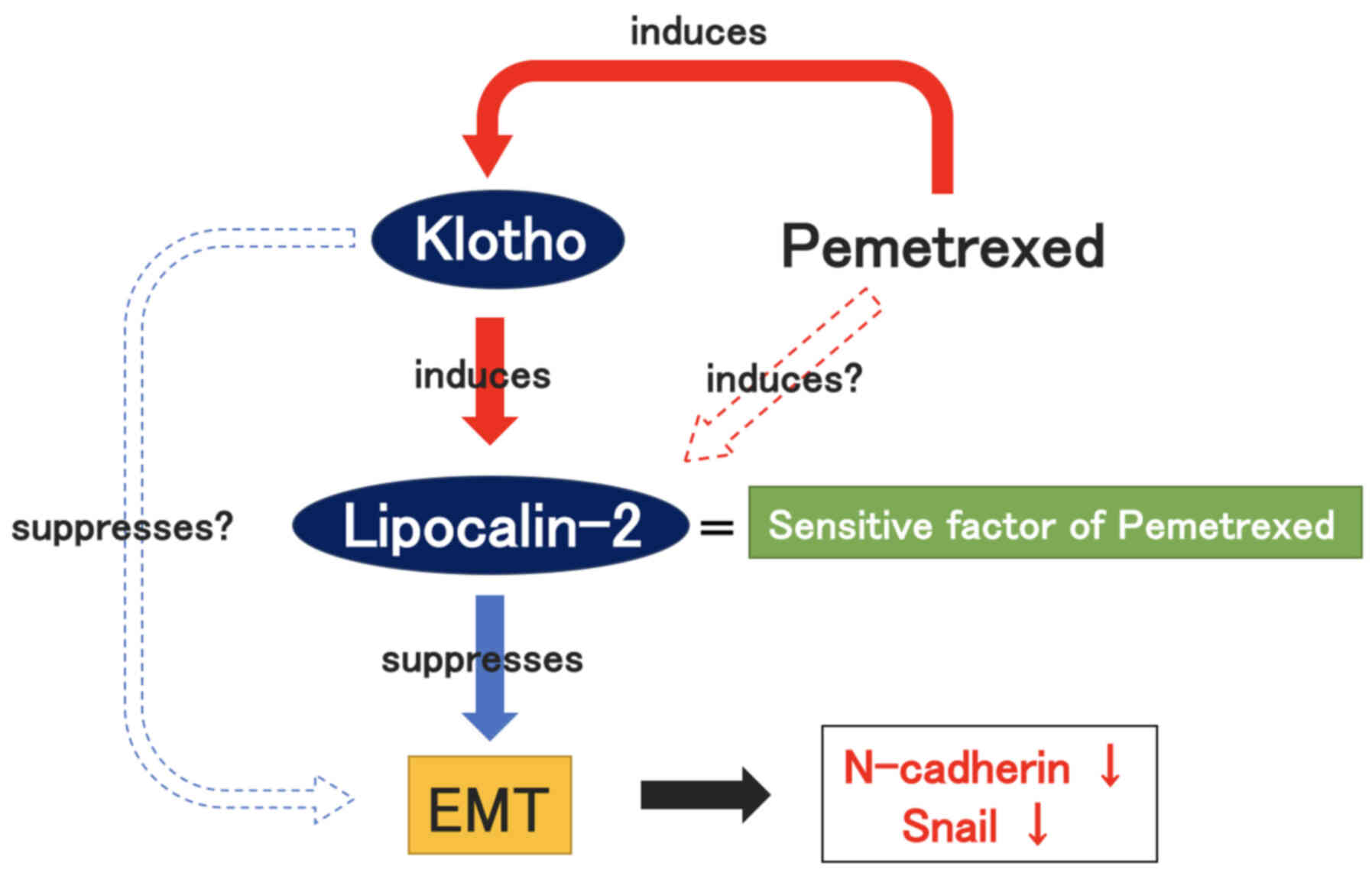|
1
|
Henley SJ, Thomas CC, Lewis DR, Ward EM,
Islami F, Wu M, Weir HK, Scott S, Sherman RL, Ma J, et al: Annual
report to the nation on the status of cancer, part II: Progress
toward Healthy People 2020 objectives for 4 common cancers. Cancer.
126:2250–2266. 2020. View Article : Google Scholar : PubMed/NCBI
|
|
2
|
Bodor JN, Kasireddy V and Borghaei H:
First-line therapies for metastatic lung adenocarcinoma without a
driver mutation. J Oncol Pract. 14:529–535. 2018. View Article : Google Scholar : PubMed/NCBI
|
|
3
|
Malhotra J, Jabbour SK and Aisner J:
Current state of immunotherapy for non-small cell lung cancer.
Transl Lung Cancer Res. 6:196–211. 2017. View Article : Google Scholar : PubMed/NCBI
|
|
4
|
Voong KR, Feliciano J, Becker D and Levy
B: Beyond PD-L1 testing-emerging biomarkers for immunotherapy in
non-small cell lung cancer. Ann Transl Med. 5:3762017. View Article : Google Scholar : PubMed/NCBI
|
|
5
|
Chen T, You Y, Jiang H and Wang ZZ:
Epithelial-mesenchymal transition (EMT): A biological process in
the development, stem cell differentiation, and tumorigenesis. J
Cell Physiol. 232:3261–3272. 2017. View Article : Google Scholar : PubMed/NCBI
|
|
6
|
Gravdal K, Halvorsen OJ, Haukaas SA and
Akslen LA: A switch from E-cadherin to N-cadherin expression
indicates epithelial to mesenchymal transition and is of strong and
independent importance for the progress of prostate cancer. Clin
Cancer Res. 13:7003–7011. 2007. View Article : Google Scholar : PubMed/NCBI
|
|
7
|
Kahlert C, Lahes S, Radhakrishnan P, Dutta
S, Mogler C, Herpel E, Brand K, Steinert G, Schneider M,
Mollenhauer M, et al: Overexpression of ZEB2 at the invasion front
of colorectal cancer is an independent prognostic marker and
regulates tumor invasion in vitro. Clin Cancer Res. 17:7654–7663.
2011. View Article : Google Scholar : PubMed/NCBI
|
|
8
|
Chen Q, Yang W, Wang X, Li X, Qi S, Zhang
Y and Gao MQ: TGF-β1 Induces EMT in bovine mammary epithelial cells
through the TGFβ1/smad signaling pathway. Cell Physiol Biochem.
43:82–93. 2017. View Article : Google Scholar : PubMed/NCBI
|
|
9
|
Jager T, Becker M, Eisenhardt A, Tilki D,
Tötsch M, Schmid KW, Romics I, Rübben H, Ergün S and Szarvas T: The
prognostic value of cadherin switch in bladder cancer. Oncol Rep.
23:1125–1132. 2010.PubMed/NCBI
|
|
10
|
Fischer KR, Durrans A, Lee S, Sheng J, Li
F, Wong ST, Choi H, El Rayes T, Ryu S, Troeger J, et al:
Epithelial-to-mesenchymal transition is not required for lung
metastasis but contributes to chemoresistance. Nature. 527:472–476.
2015. View Article : Google Scholar : PubMed/NCBI
|
|
11
|
Ryu HS, Park DJ, Kim HH, Kim WH and Lee
HS: Combination of epithelial-mesenchymal transition and cancer
stem cell-like phenotypes has independent prognostic value in
gastric cancer. Hum Pathol. 43:520–528. 2012. View Article : Google Scholar : PubMed/NCBI
|
|
12
|
Ye X, Brabletz T, Kang Y, Longmore GD,
Nieto MA, Stanger BZ, Yang J and Weinberg RA: Upholding a role for
EMT in breast cancer metastasis. Nature. 547:E1–E3. 2017.
View Article : Google Scholar : PubMed/NCBI
|
|
13
|
Ye X, Tam WL, Shibue T, Kaygusuz Y,
Reinhardt F, Ng Eaton E and Weinberg RA: Distinct EMT programs
control normal mammary stem cells and tumour-initiating cells.
Nature. 525:256–260. 2015. View Article : Google Scholar : PubMed/NCBI
|
|
14
|
Nieto MA, Huang RY, Jackson RA and Thiery
JP: EMT: 2016. Cell. 166:21–45. 2016. View Article : Google Scholar : PubMed/NCBI
|
|
15
|
Terry S, Buart S, Tan TZ, Gros G, Noman
MZ, Lorens JB, Mami-Chouaib F, Thiery JP and Chouaib S: Acquisition
of tumor cell phenotypic diversity along the EMT spectrum under
hypoxic pressure: Consequences on susceptibility to cell-mediated
cytotoxicity. Oncoimmunology. 6:e12718582017. View Article : Google Scholar : PubMed/NCBI
|
|
16
|
Xu X, Zhang L, He X, Zhang P, Sun C, Xu X,
Lu Y and Li F: TGF-β plays a vital role in triple-negative breast
cancer (TNBC) drug-resistance through regulating stemness, EMT and
apoptosis. Biochem Biophys Res Commun. 502:160–165. 2018.
View Article : Google Scholar : PubMed/NCBI
|
|
17
|
Tan TZ, Miow QH, Miki Y, Noda T, Mori S,
Huang RY and Thiery JP: Epithelial-mesenchymal transition spectrum
quantification and its efficacy in deciphering survival and drug
responses of cancer patients. EMBO Mol Med. 6:1279–1293. 2014.
View Article : Google Scholar : PubMed/NCBI
|
|
18
|
Shah PP, Dupre TV, Siskind LJ and Beverly
LJ: Common cytotoxic chemotherapeutics induce
epithelial-mesenchymal transition (EMT) downstream of ER stress.
Oncotarget. 8:22625–22639. 2017. View Article : Google Scholar : PubMed/NCBI
|
|
19
|
Kuro-o M, Matsumura Y, Aizawa H, Kawaguchi
H, Suga T, Utsugi T, Ohyama Y, Kurabayashi M, Kaname T, Kume E, et
al: Mutation of the mouse klotho gene leads to a syndrome
resembling ageing. Nature. 390:45–51. 1997. View Article : Google Scholar : PubMed/NCBI
|
|
20
|
Matsumura Y, Aizawa H, Shiraki-Iida T,
Nagai R, Kuro-o M and Nabeshima Y: Identification of the human
klotho gene and its two transcripts encoding membrane and secreted
klotho protein. Biochem Biophys Res Commun. 242:626–630. 1998.
View Article : Google Scholar : PubMed/NCBI
|
|
21
|
Kurosu H, Yamamoto M, Clark JD, Pastor JV,
Nandi A, Gurnani P, McGuinness OP, Chikuda H, Yamaguchi M,
Kawaguchi H, et al: Suppression of aging in mice by the hormone
Klotho. Science. 309:1829–1833. 2005. View Article : Google Scholar : PubMed/NCBI
|
|
22
|
Rubinek T and Wolf I: The role of
alpha-klotho as a universal tumor suppressor. Vitam Horm.
101:197–214. 2016. View Article : Google Scholar : PubMed/NCBI
|
|
23
|
Delcroix V, Mauduit O, Tessier N,
Montillaud A, Lesluyes T, Ducret T, Chibon F, Van Coppenolle F,
Ducreux S and Vacher P: The role of the anti-aging protein klotho
in IGF-1 signaling and reticular calcium leak: Impact on the
chemosensitivity of dedifferentiated liposarcomas. Cancers (Basel).
10:4392018. View Article : Google Scholar
|
|
24
|
Wolf I, Levanon-Cohen S, Bose S, Ligumsky
H, Sredni B, Kanety H, Kuro-o M, Karlan B, Kaufman B, Koeffler HP
and Rubinek T: Klotho: A tumor suppressor and a modulator of the
IGF-1 and FGF pathways in human breast cancer. Oncogene.
27:7094–7105. 2008. View Article : Google Scholar : PubMed/NCBI
|
|
25
|
Xie B, Chen J, Liu B and Zhan J: Klotho
acts as a tumor suppressor in cancers. Pathol Oncol Res.
19:611–617. 2013. View Article : Google Scholar : PubMed/NCBI
|
|
26
|
Wolf I, Laitman Y, Rubinek T, Abramovitz
L, Novikov I, Beeri R, Kuro-O M, Koeffler HP, Catane R, Freedman
LS, et al: Functional variant of KLOTHO: A breast cancer risk
modifier among BRCA1 mutation carriers of Ashkenazi origin.
Oncogene. 29:26–33. 2010. View Article : Google Scholar : PubMed/NCBI
|
|
27
|
Zhang J, Cao K, Pastor JV, Li L, Moe OW
and Hsia CCW: Alpha-Klotho, a critical protein for lung health, is
not expressed in normal lung. FASEB Bioadv. 1:675–687. 2019.
View Article : Google Scholar : PubMed/NCBI
|
|
28
|
Usuda J, Ichinose S, Ishizumi T, Ohtani K,
Inoue T, Saji H, Kakihana M, Kajiwara N, Uchida O, Nomura M, et al:
Klotho predicts good clinical outcome in patients with
limited-disease small cell lung cancer who received surgery. Lung
Cancer. 74:332–337. 2011. View Article : Google Scholar : PubMed/NCBI
|
|
29
|
Usuda J, Ichinose S, Ishizumi T, Ohtani K,
Inoue T, Saji H, Kakihana M, Kajiwara N, Uchida O, Nomura M, et al:
Klotho is a novel biomarker for good survival in resected large
cell neuroendocrine carcinoma of the lung. Lung Cancer. 72:355–359.
2011. View Article : Google Scholar : PubMed/NCBI
|
|
30
|
Ibi T, Usuda J, Inoue T, Sato A and
Takegahara K: Klotho expression is correlated to molecules
associated with epithelial-mesenchymal transition in lung squamous
cell carcinoma. Oncol Lett. 14:5526–5532. 2017.PubMed/NCBI
|
|
31
|
Rollins KD and Lindley C: Pemetrexed: A
multitargeted antifolate. Clin Ther. 27:1343–1382. 2005. View Article : Google Scholar : PubMed/NCBI
|
|
32
|
Liang SQ, Marti TM, Dorn P, Froment L,
Hall SR, Berezowska S, Kocher G, Schmid RA and Peng RW: Blocking
the epithelial-to-mesenchymal transition pathway abrogates
resistance to anti-folate chemotherapy in lung cancer. Cell Death
Dis. 195:e18242015. View Article : Google Scholar
|
|
33
|
Buckley AF and Kakar S: Comparison of the
Dako EGFR pharmDx kit and Zymed EGFR antibody for assessment of
EGFR status in colorectal adenocarcinoma. Appl Immunohistochem Mol
Morphol. 15:305–309. 2007. View Article : Google Scholar : PubMed/NCBI
|
|
34
|
Usuda J, Azizuddin K, Chiu SM and Oleinick
NL: Association between the photodynamic loss of Bcl-2 and the
sensitivity to apoptosis caused by phthalocyanine photodynamic
therapy. Photochem Photobiol. 78:1–8. 2003. View Article : Google Scholar : PubMed/NCBI
|
|
35
|
Maehara S, Usuda J, Ishizumi T, Ichinose
S, Ohtani K, Inoue T, Imai K, Furumoto H, Kudo Y, Kajiwara N, et
al: Combination effect of photodynamic therapy using NPe6 with
pemetrexed for human malignant pleural mesothelioma cells. Int J
Oncol. 46:741–749. 2015. View Article : Google Scholar : PubMed/NCBI
|
|
36
|
Booth L, Roberts JL, Tavallai M,
Chuckalovcak J, Stringer DK, Koromilas AE, Boone DL, McGuire WP,
Poklepovic A and Dent P: [Pemetrexed + Sorafenib] lethality is
increased by inhibition of ERBB1/2/3-PI3K-NFκB compensatory
survival signaling. Oncotarget. 7:23608–23632. 2016. View Article : Google Scholar : PubMed/NCBI
|
|
37
|
Takahashi A, Seike M, Chiba M, Takahashi
S, Nakamichi S, Matsumoto M, Takeuchi S, Minegishi Y, Noro R,
Kunugi S, et al: Ankyrin repeat domain 1 overexpression is
associated with common resistance to afatinib and osimertinib in
EGFR-mutant lung cancer. Sci Rep. 8:148962018. View Article : Google Scholar : PubMed/NCBI
|
|
38
|
Nakamichi S, Seike M, Miyanaga A, Chiba M,
Zou F, Takahashi A, Ishikawa A, Kunugi S, Noro R, Kubota K and
Gemma A: Overcoming drug-tolerant cancer cell subpopulations
showing AXL activation and epithelial-mesenchymal transition is
critical in conquering ALK-positive lung cancer. Oncotarget.
9:27242–27255. 2018. View Article : Google Scholar : PubMed/NCBI
|
|
39
|
Noro R, Miyanaga A, Minegishi Y, Okano T,
Seike M, Soeno C, Kataoka K, Matsuda K, Yoshimura A and Gemma A:
Histone deacetylase inhibitor enhances sensitivity of
non-small-cell lung cancer cells to 5-FU/S-1 via down-regulation of
thymidylate synthase expression and up-regulation of p21waf1/cip1
expression. Cancer Sci. 101:1424–1430. 2010. View Article : Google Scholar : PubMed/NCBI
|
|
40
|
Herbst RS, Morgensztern D and Boshoff C:
The biology and management of non-small cell lung cancer. Nature.
553:446–454. 2018. View Article : Google Scholar : PubMed/NCBI
|
|
41
|
Giovannetti E, Lemos C, Tekle C, Smid K,
Nannizzi S, Rodriguez JA, Ricciardi S, Danesi R, Giaccone G and
Peters GJ: Molecular mechanisms underlying the synergistic
interaction of erlotinib, an epidermal growth factor receptor
tyrosine kinase inhibitor, with the multitargeted antifolate
pemetrexed in non-small-cell lung cancer cells. Mol Pharmacol.
73:1290–1300. 2008. View Article : Google Scholar : PubMed/NCBI
|
|
42
|
Folwaczny M, Karnesi E, Berger T and
Paschos E: Clinical association between chronic periodontitis and
the leukocyte extravasation inhibitors developmental endothelial
locus-1 and pentraxin-3. Eur J Oral Sci. 125:258–264. 2017.
View Article : Google Scholar : PubMed/NCBI
|
|
43
|
Kamal Y, Schmit SL, Hoehn HJ, Amos CI and
Frost HR: Transcriptomic differences between primary colorectal
adenocarcinomas and distant metastases reveal metastatic colorectal
cancer subtypes. Cancer Res. 79:4227–4241. 2019. View Article : Google Scholar : PubMed/NCBI
|
|
44
|
Fernandez-Garcia CE, Roldan-Montero R,
Tarin C, Martinez-Lopez D, Pastor-Vargas C, Blanco-Colio LM and
Martín-Ventura JL: Lipocalin-2, a potential therapeutic target in
advanced atherosclerosis. Atherosclerosis. 278:321–322. 2018.
View Article : Google Scholar : PubMed/NCBI
|
|
45
|
Doi S, Zou Y, Togao O, Pastor JV, John GB,
Wang L, Shiizaki K, Gotschall R, Schiavi S, Yorioka N, et al:
Klotho inhibits transforming growth factor-beta1 (TGF-beta1)
signaling and suppresses renal fibrosis and cancer metastasis in
mice. J Biol Chem. 286:8655–8665. 2011. View Article : Google Scholar : PubMed/NCBI
|
|
46
|
Marques da Fonseca L, Jacques da Silva LR,
Santos Dos Reis J, Rodrigues da Costa Santos MA, de Sousa Chaves V,
Monteiro da Costa K, Sa-Diniz JN, Freire de Lima CG, Morrot A,
Nunes Franklim T, et al: Piperine inhibits TGF-β signaling pathways
and disrupts EMT-related events in human lung adenocarcinoma cells.
Medicines (Basel). 7:192020. View Article : Google Scholar
|
|
47
|
Chen B, Ma X, Liu S, Zhao W and Wu J:
Inhibition of lung cancer cells growth, motility and induction of
apoptosis by Klotho, a novel secreted Wnt antagonist, in a
dose-dependent manner. Cancer Biol Ther. 13:1221–1228. 2012.
View Article : Google Scholar : PubMed/NCBI
|
|
48
|
Xu D, Yuan H, Meng Z, Yang C, Li Z, Li M,
Zhang Z, Gan Y and Tu H: Cadherin 13 inhibits pancreatic cancer
progression and epithelial-mesenchymal transition by Wnt/β-catenin
signaling. J Cancer. 11:2101–2112. 2020. View Article : Google Scholar : PubMed/NCBI
|
|
49
|
Wu MF, Hsiao YM, Huang CF, Huang YH, Yang
WJ, Chan HW, Chang JT and Ko JL: Genetic determinants of pemetrexed
responsiveness and nonresponsiveness in non-small cell lung cancer
cells. J Thorac Oncol. 5:1143–1151. 2010. View Article : Google Scholar : PubMed/NCBI
|
|
50
|
Wang YP, Yu GR, Lee MJ, Lee SY, Chu IS,
Leem SH and Kim DG: Lipocalin-2 negatively modulates the
epithelial-to-mesenchymal transition in hepatocellular carcinoma
through the epidermal growth factor (TGF-beta1)/Lcn2/Twist1
pathway. Hepatology. 58:1349–1361. 2013. View Article : Google Scholar : PubMed/NCBI
|
|
51
|
Feng M, Feng J, Chen W, Wang W, Wu X,
Zhang J, Xu F and Lai M: Lipocalin2 suppresses metastasis of
colorectal cancer by attenuating NF-κB-dependent activation of
snail and epithelial mesenchymal transition. Mol Cancer. 15:772016.
View Article : Google Scholar : PubMed/NCBI
|
|
52
|
Cheng J, Chen J, Zhao Y, Yang J, Xue K and
Wang Z: MicroRNA-761 suppresses remodeling of nasal mucosa and
epithelial-mesenchymal transition in mice with chronic
rhinosinusitis through LCN2. Stem Cell Res Ther. 11:1512020.
View Article : Google Scholar : PubMed/NCBI
|
|
53
|
Tao L, Shu-Ling W, Jing-Bo H, Ying Z, Rong
H, Xiang-Qun L, Wen-Jie C and Lin-Fu Z: MiR-451a attenuates
doxorubicin resistance in lung cancer via suppressing
epithelialmesenchymal transition (EMT) through targeting c-Myc.
Biomed Pharmacother. 125:1099622020. View Article : Google Scholar : PubMed/NCBI
|
|
54
|
Ren D, Wang M, Guo W, Zhao X, Tu X, Huang
S, Zou X and Peng X: Wild-type p53 suppresses the
epithelial-mesenchymal transition and stemness in PC-3 prostate
cancer cells by modulating miR145. Int J Oncol. 42:1473–1481. 2013.
View Article : Google Scholar : PubMed/NCBI
|
|
55
|
Kuo WT, Tu DG, Chiu LY, Sheu GT and Wu MF:
High pemetrexed sensitivity of docetaxel-resistant A549 cells is
mediated by TP53 status and downregulated thymidylate synthase.
Oncol Rep. 38:2787–2795. 2017. View Article : Google Scholar : PubMed/NCBI
|
|
56
|
Chiu LY, Hsin IL, Yang TY, Sung WW, Chi
JY, Chang JT, Ko JL and Sheu GT: The ERK-ZEB1 pathway mediates
epithelial-mesenchymal transition in pemetrexed resistant lung
cancer cells with suppression by vinca alkaloids. Oncogene.
36:242–253. 2017. View Article : Google Scholar : PubMed/NCBI
|
|
57
|
Yoon JY, Park CK, Choi YD, Oh IJ and Kim
YC: Predictive factors for long-term responders of pemetrexed
maintenance treatment in non-small cell lung cancer. Thorac Cancer.
10:942–949. 2019. View Article : Google Scholar : PubMed/NCBI
|















